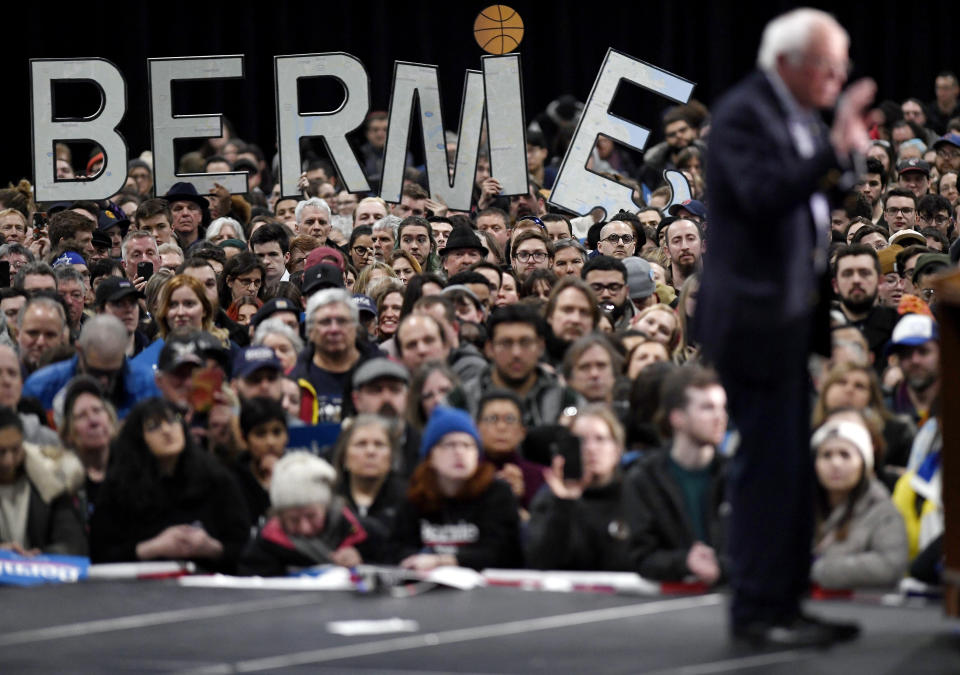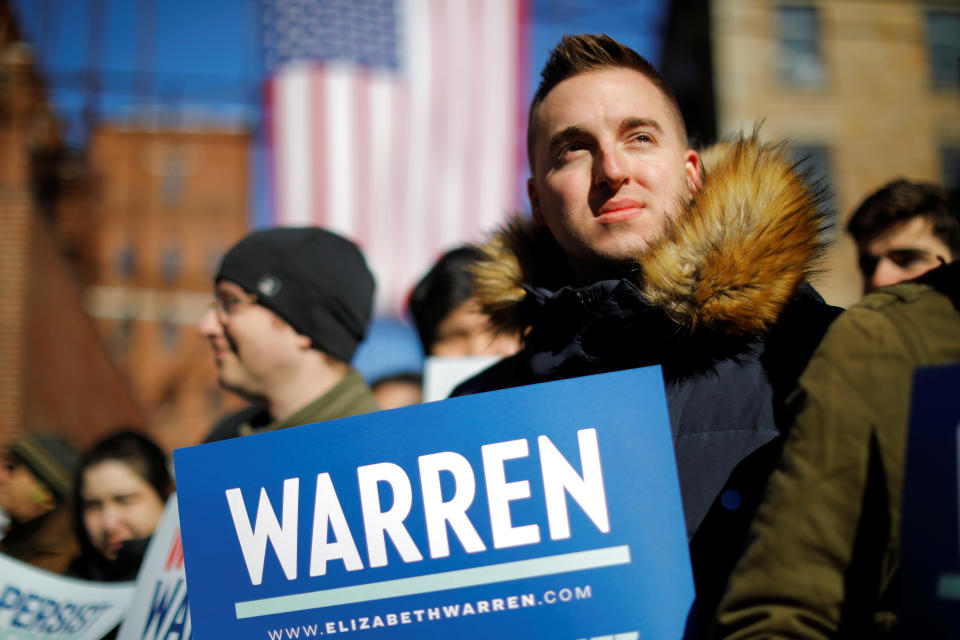‘I love Liz, but yeah, I love Bernie’: Sanders and Warren battle for the progressive mantle in her home state
At a campaign rally for Vermont Senator Bernie Sanders on Friday, in Springfield, Mass., Mary Alice Baker eagerly waited for the Democratic presidential front-runner to step on stage — but she said she plans to vote for one of his rivals, Massachusetts Senator Elizabeth Warren.
“I would hate to see her lose Massachusetts,” says Baker, 68, a retired state employee who has lived in Massachusetts for nearly half a century. “I love Liz, but yeah, I love Bernie, too.”
“He’s a Democratic socialist and she’s a progressive capitalist,” Baker adds. “They’re both progressive.”
Massachusetts — which Gallup polls consistently find to be the most liberal state in the U.S. — has emerged as a key battleground between the two candidates on the race’s left flank. Sanders is seeking a crushing blow to Warren’s struggling campaign in her home state, showing he’s the progressive best fit to go toe-to-toe with former Vice President Joe Biden, while Warren wants to propel her bid back into the race’s upper echelon.

The landslide victory for Biden in South Carolina on Saturday — and the subsequent departures of former South Bend Mayor Pete Buttigieg and Minnesota Senator Amy Klobuchar from the race — put even more pressure on this state to strengthen the case for either of the progressive candidates. Polls in Massachusetts show Warren and Sanders essentially tied ahead of its primary on March 3, also known as Super Tuesday.
Two different approaches
In conversations with supporters of Sanders and Warren in Massachusetts, many said they chose between the two, and nearly all agreed that Warren had shifted toward a centrist appeal over the course of the presidential race, while Sanders stuck to the progressive talking points he had delivered for decades.
For Sanders supporters, that different approach signaled their candidate’s consistency and Warren’s betrayal; for Warren’s supporters, it meant she had broadened her message for a nationwide electorate while Sanders remained inflexible.

“It was not an easy choice for a lot of people in Massachusetts,” says Ed Collins, 74, a retiree who volunteered for Warren’s Senate races in 2012 and 2018 but said he’s excited to help Sanders become the nominee. “I never thought I’d live to see this day.”
Sanders made weekend stops in Boston and Springfield, where 4,750 people gathered on Friday to hear him deliver a familiar message, assailing the political influence of billionaires and promoting ambitious social programs like Medicare for All. “Wall Street is getting nervous,” Sanders told the crowd.
Warren’s name went unmentioned by speakers at the rally, whether from Sanders or the local politicians who preceded him. But indirect reference was made to Warren’s campaign slogan of “big, structural change” and to her decision last month to reverse her position rejecting Super PAC support.
“I’m ready for a new president who believes in big, bold, structural change and who has the courage, and the passion, and the plans to make it happen,” Democratic Massachusetts Rep. Lindsay Sabadosa told the crowd of Sanders, who later celebrated his campaign’s lack of Super PAC support.
“One of the things I’m very, very proud of and all of you should be very, very proud of: Our campaign does not have a Super PAC,” Sanders says. The Sanders campaign does, however, have the support of the Super PAC affiliated with the National Nurses United, which has supported the Sanders campaign.
Asked about Warren’s decision to take Super PAC support, Democratic Massachusetts Rep. Paul Mark, a co-chair for the Sanders campaign in the state, says, “Bernie Sanders has consistently not taken that kind of money and I think that’s really great.”
“That’s a great reason to support him,” he adds.
Democratic U.S. House Rep. Jim McGovern, who represents central Massachusetts, told Yahoo Finance there’s “no contradiction” in Warren’s decision to take Super PAC funds.
“She’s been very clear from the very beginning, that our political system is corrupted by big money,” he adds. “The bottom line is in order to change the reality we have to get her elected as president.”
McGovern also praised Warren’s willingness to adjust her progressive message for a nationwide race.
“Elizabeth understands that politics is about addition,” McGovern says. “Her views haven’t changed, but she understands that in order to win the presidency it can’t just be the liberal base that comes on board, we’re going to have to broaden our coalition here. The goal is to defeat Donald Trump.”
For his part, Sanders has argued that he will defeat Trump with an exciting campaign that drives voter turnout, though turnout for Sanders in the early primary states has not reflected that.
Democratic Massachusetts Rep. Bud Williams, who has backed Warren, said Warren is the progressive candidate best fit to win the general election and enact her agenda when in office.
“The dream new deal takes center stage and that’s great,” he says. “But let’s be real about it, this is a very moderate country.”
Read more:
